2000 Summer Reading List
Here’s a look at the featured selections for the 1st annual J.P. Morgan Summer Reading List.
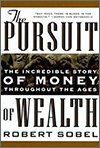 The Pursuit of Wealth: The Incredible Story of Money Throughout the Ages.
Go back in time—to the age of merchants, explorers, bankers, farmers, industrialists—then leap forward with today’s information economy leaders and discover
how the accumulation of wealth, power, and status has changed over time. Robert Sobel recounts tales of great fortunes won and lost.
The Pursuit of Wealth: The Incredible Story of Money Throughout the Ages.
Go back in time—to the age of merchants, explorers, bankers, farmers, industrialists—then leap forward with today’s information economy leaders and discover
how the accumulation of wealth, power, and status has changed over time. Robert Sobel recounts tales of great fortunes won and lost.
 The Essays of Warren Buffett: Lessons for Corporate America.
Warren Buffett’s classic letters to Berkshire Hathaway shareholders are a must-read for investors and business cognoscenti alike. Professor Lawrence Cunningham has selected
the best of Buffett’s “plain word” prose for insights on topics ranging from selecting managers and investments to valuing businesses and financial information.
Instructive and entertaining.
The Essays of Warren Buffett: Lessons for Corporate America.
Warren Buffett’s classic letters to Berkshire Hathaway shareholders are a must-read for investors and business cognoscenti alike. Professor Lawrence Cunningham has selected
the best of Buffett’s “plain word” prose for insights on topics ranging from selecting managers and investments to valuing businesses and financial information.
Instructive and entertaining.
 Security Analysis (Classic 1934 Edition)
This classic, which Benjamin Graham co-authored with David Dodd, offers time-tested investment secrets and strategies from one of Wall Street’s immortals. Written just five
years after the 1929 crash, the messages are just as vivid and just as vital as when they first appeared.
Security Analysis (Classic 1934 Edition)
This classic, which Benjamin Graham co-authored with David Dodd, offers time-tested investment secrets and strategies from one of Wall Street’s immortals. Written just five
years after the 1929 crash, the messages are just as vivid and just as vital as when they first appeared.
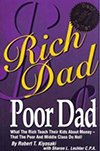 Rich Dad, Poor Dad.
Ten valuable philosophies to share with your children and teach them what they won’t learn in school: financial literacy. Lessons include the history of taxes and corporate
power, and how to work to learn. A New York Times, Wall Street Journal and Business Week best seller, Rich Dad, Poor Dad by Robert Kiyosaki and Sharon Lechter offers parents
(and grandparents!) a starting point for educating the next generation.
Rich Dad, Poor Dad.
Ten valuable philosophies to share with your children and teach them what they won’t learn in school: financial literacy. Lessons include the history of taxes and corporate
power, and how to work to learn. A New York Times, Wall Street Journal and Business Week best seller, Rich Dad, Poor Dad by Robert Kiyosaki and Sharon Lechter offers parents
(and grandparents!) a starting point for educating the next generation.
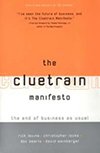 The Cluetrain Manifesto.
An inside look at the real power of the web—not the technology but the profound changes it brings to the way people interact with businesses. Cluetrain’s authors,
Rick Levine, Christopher Locke, Doc Searls and David Weinberger, look at how markets are getting smarter faster, how networked employees and customers represent a powerful new
force in business, and how companies that fail to keep pace with these new market connections and dialogues risk failure.
The Cluetrain Manifesto.
An inside look at the real power of the web—not the technology but the profound changes it brings to the way people interact with businesses. Cluetrain’s authors,
Rick Levine, Christopher Locke, Doc Searls and David Weinberger, look at how markets are getting smarter faster, how networked employees and customers represent a powerful new
force in business, and how companies that fail to keep pace with these new market connections and dialogues risk failure.
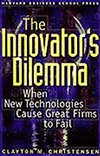 The Innovator’s Dilemma: When New Technologies Cause Great Firms to Fail.
Harvard business professor Clayton Christensen shows that even great companies that do everything right can still fail. Their undoing: disruptive technologies and market changes.
Learn how even the most aggressive, high growth companies reject truly breakthrough innovations because customers seem reluctant to adopt them—and how the companies willing
to capitalize on disruptive forces are poised for exceptional growth.
The Innovator’s Dilemma: When New Technologies Cause Great Firms to Fail.
Harvard business professor Clayton Christensen shows that even great companies that do everything right can still fail. Their undoing: disruptive technologies and market changes.
Learn how even the most aggressive, high growth companies reject truly breakthrough innovations because customers seem reluctant to adopt them—and how the companies willing
to capitalize on disruptive forces are poised for exceptional growth.
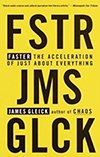 Faster. Acceleration—it’s the feature that defines today’s techno-saturated age.
Everything is running faster than ever before. We have become a quick-reflexed, multi-tasking, channel-flipping, fast-forwarding species, and noted science author James Gleick
holds up the mirror to it all. So slow down and learn how speed is the new whip behind the acceleration of just about everything.
Faster. Acceleration—it’s the feature that defines today’s techno-saturated age.
Everything is running faster than ever before. We have become a quick-reflexed, multi-tasking, channel-flipping, fast-forwarding species, and noted science author James Gleick
holds up the mirror to it all. So slow down and learn how speed is the new whip behind the acceleration of just about everything.
![]() The Silicon Boys and Their Valley Dreams.
Come to the epicenter of the .com phenomenon and witness the life and culture of Silicon Valley with prize-winning journalist David Kaplan (Newsweek). Learn what happens when
ownership and options replace wages. Meet the entrepreneurs and financiers who have transformed the ”Valley of Hearts Delight“ into an innovation power-region
that’s been credited with “the largest legal creation of wealth in the history of the planet.”
The Silicon Boys and Their Valley Dreams.
Come to the epicenter of the .com phenomenon and witness the life and culture of Silicon Valley with prize-winning journalist David Kaplan (Newsweek). Learn what happens when
ownership and options replace wages. Meet the entrepreneurs and financiers who have transformed the ”Valley of Hearts Delight“ into an innovation power-region
that’s been credited with “the largest legal creation of wealth in the history of the planet.”
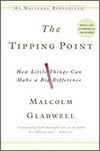 The Tipping Point: How Little Things Can Make a Big Difference.
New Yorker writer Malcolm Gladwell looks at why major changes in our society so often happen suddenly and unexpectedly. Ideas, behavior, messages, and products spread like wildfire.
Meet the personality types who are natural pollinators of new ideas and trends that affect the way we live, work, and play.
The Tipping Point: How Little Things Can Make a Big Difference.
New Yorker writer Malcolm Gladwell looks at why major changes in our society so often happen suddenly and unexpectedly. Ideas, behavior, messages, and products spread like wildfire.
Meet the personality types who are natural pollinators of new ideas and trends that affect the way we live, work, and play.
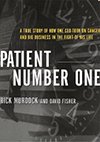 Patient Number One.
A first-hand account of how one biotech CEO took on cancer and big business in the fight of his life. This fast-paced account by Rick Murdock, former CEO of CellPro, and author
David Fisher, proves that truth can be stranger than fiction. Murdock tells the dramatic story of his fight against a deadly lymphoma that could only be treated with technology
invented by his company. But as “patient number one” he also had to lead a courtroom battle that pitted medical miracles against big business.
Patient Number One.
A first-hand account of how one biotech CEO took on cancer and big business in the fight of his life. This fast-paced account by Rick Murdock, former CEO of CellPro, and author
David Fisher, proves that truth can be stranger than fiction. Murdock tells the dramatic story of his fight against a deadly lymphoma that could only be treated with technology
invented by his company. But as “patient number one” he also had to lead a courtroom battle that pitted medical miracles against big business.
